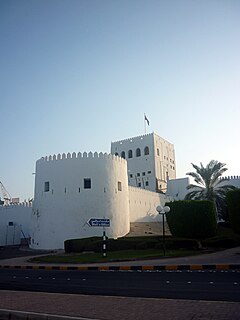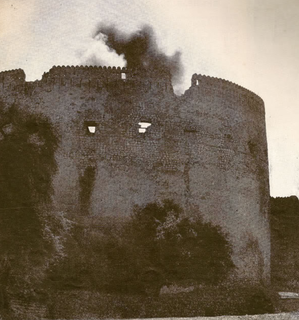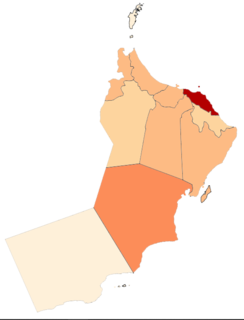Related Research Articles

Oman, officially the Sultanate of Oman, is a country on the southeastern coast of the Arabian Peninsula in Western Asia. Formerly a maritime empire, Oman is the oldest continuously independent state in the Arab world. Located in a strategically important position at the mouth of the Persian Gulf, the country shares land borders with the United Arab Emirates to the northwest, Saudi Arabia to the west, and Yemen to the southwest, and shares maritime borders with Iran, and Pakistan. The coast is formed by the Arabian Sea on the southeast, and the Gulf of Oman on the northeast. The Madha and Musandam exclaves are surrounded by the UAE on their land borders, with the Strait of Hormuz and the Gulf of Oman forming Musandam's coastal boundaries. Muscat is its capital and largest city.

Muscat is the capital city and is the most populated city in Oman. It is the seat of the Governorate of Muscat. According to the National Centre for Statistics and Information (NCSI), the total population of Muscat Governorate was 1.4 million as of September 2018. The metropolitan area spans approximately 3,500 km2 (1,400 sq mi) and includes six provinces called wilayats. Known since the early 1st century AD as an important trading port between the west and the east, Muscat was ruled by various indigenous tribes as well as foreign powers such as the Persians, the Portuguese Empire, the Iberian Union and the Ottoman Empire at various points in its history. A regional military power in the 18th century, Muscat's influence extended as far as East Africa and Zanzibar. As an important port-town in the Gulf of Oman, Muscat attracted foreign tradesmen and settlers such as the Persians and the Balochis. Since the ascension of Qaboos bin Said as Sultan of Oman in 1970, Muscat has experienced rapid infrastructural development that has led to the growth of a vibrant economy and a multi-ethnic society. Muscat is termed as a Beta - Global City by the Globalization and World Cities Research Network.

The national flag of Oman consists of three stripes with a red bar on the left that contains the national emblem of Oman.

The national emblem of Oman is Khanjar Bo Sayfain, an insignia consisting of a khanjar inside its sheath that is superimposed upon two crossed swords. Adopted in the 18th century as the badge of the Omani royal family, it subsequently became the national emblem of the Sultanate of Oman. The emblem is featured at the canton on the Flag of Oman.

Sohar is the capital and largest city of the Al Batinah North Governorate in Oman. An ancient capital of the country that once served as an important Islamic port town, Suhar has also been credited as the mythical birthplace of Sinbad the Sailor.

The Sultanate of Muscat and Oman, also known briefly as the State of Muscat and Oman during the rule of Timur ibn Faisal, was a sovereign state that encompassed the present-day Sultanate of Oman and parts of present-day United Arab Emirates and Gwadar, Pakistan, in the second half of the 19th century and 20th century. Ruled by the Al Busaid dynasty, it was established as a result of the partition of the Omani Empire upon the death of its last ruler Said ibn Sultan. The Sultanate transitioned into a new form of government after the palace coup of 23 July 1970 in which the sultan Said ibn Timur was immediately deposed in favor of his son Qaboos ibn Said.

The administrative division of Oman contains Eleven Governorates (muhafazah):

Al-Seeb, As Seeb or As Sib is a coastal fishing city, located several kilometres northwest of Muscat, in northeastern Oman. As of the 2020 census, it had a population of 470,878.

A khanjar is a traditional dagger originating from Oman. Worn by men for ceremonial occasions, it is a short curved sword shaped like the letter "J" and resembles a hook. It can be made from a variety of different materials, depending on the quality of its craftsmanship. It is a popular souvenir among tourists and is sold in souqs throughout the region. A national symbol of the sultanate, the khanjar is featured on Oman's national emblem and on the Omani rial. It also features in logos and commercial imagery by companies based in Oman.

The Imamate of Oman refers to a historical state within the Oman proper in the present-day Al Hajar Mountains in Sultanate of Oman. The capital of the Imamate alternated historically between Rustaq and Nizwa. The Imamate's territory extended north to Ibri and south to Alsharqiyah region and the Sharqiya Sands. The Imamate was bounded from the east by the Al Hajar Mountains and from the west by the Rub' al Khali desert. The Al Hajar Mountains separated the Imamate of Oman from the Sultanate of Muscat. The elected Imam (ruler) resided in the capital, and Walis (governors) represented the Imamate in its different regions.

The Royal Oman Police (ROP), also known as Oman Police, is the main law and order agency for the Sultanate of Oman. It maintains a helicopter fleet and also carries on the duties of safeguarding the long Omani coastline.

Women in Oman now pursue careers and professional training, moving from their previous and traditional role at home to the public sphere. In Oman, 17 October is celebrated every year as the Omani Women's Day with various pro-female events.

The Jebel Akhdar War or the Oman War, also known as Jebel Akhdar rebellion broke out in 1954 and again in 1957 in Oman, as an effort by the local Omanis in the interior of Oman led by their elected Imam, Ghalib Alhinai, to protect the Imamate of Oman from the occupation plans of sultan Said bin Taimur, backed by the British government, who were eager to gain access to the oil wells in the interior lands of Oman. Sultan Said received direct financing to raise an armed force to occupy the Imamate of Oman from Iraq Petroleum Company (IPC), a consortium of oil companies that was majorly owned by what is known today as Royal Dutch Shell, Total, ExxonMobil and British Petroleum (BP); the latter was majority-owned by the British government. The Imamate was eventually supported by Arab states. The war lasted until 1959, when the British armed forces decided to take on direct interventions using air and ground attacks on the Imamate, which won the Sultanate the war. The declarations signed by the sultans of Muscat to consult the British government on all important matters, the unequal trade treaties signed by the two sides favoring British interests, the cessation of the Omani Kuria Muria islands to the British, and the vast control over the Sultanate's government ministries, including defense and foreign affairs, exerted by the British rendered the Sultanate a de facto British colony. The UN General Assembly adopted the 'Question of Oman' resolution in 1965, 1966 and again in 1967 that called upon the British government to cease all repressive action against the locals, end British control over Oman and reaffirmed the inalienable right of the Omani people to self-determination and independence.

The Omani Empire was a maritime empire, vying with Portugal and Britain for trade and influence in the Persian Gulf and Indian Ocean. At its peak in the 19th century, Omani influence or control extended across the Strait of Hormuz to modern-day Iran and Pakistan, and as far south as Cape Delgado. After the death of Said bin Sultan in 1856 the empire was divided between his sons into two sultanates, an African section ruled by Majid bin Said and an Asian section ruled by Thuwaini bin Said.

The Royal Office transliterated:maktab al sultani is one of the most senior and therefore powerful ministries in the Sultanate of Oman. It is a government body that has most influence in national security and intelligence issues and the minister in charge has been the de facto national security advisor to the Sultan. The Palace Office also acts as a foreign liaison focus on all international intelligence and security matters.
Dhalkut is a Wilayat of Dhofar in the Sultanate of Oman.

The COVID-19 pandemic in Oman is part of the worldwide pandemic of coronavirus disease 2019 caused by severe acute respiratory syndrome coronavirus 2. The virus was confirmed to have reached Oman on 24 February 2020 when two citizens tested positive for COVID-19 after returning from Iran. As of 21 August 2021, the total number of cases registered in the sultanate is 300,914, of which 289,450 have recovered and 4,020 have died. Initially, the majority of the cases and deaths occurred in the expatriate community. By July 2020, as the pandemic entered its fourth month in the country, the majority of the cases and deaths had occurred among the citizens.
References
- ↑ "Population - DATA PORTAL". National Centre for Statistics & Information. Retrieved 2021-10-15.
- ↑ "Oman Governorates and Regions". Sultanate of Oman. Retrieved 2 February 2019.